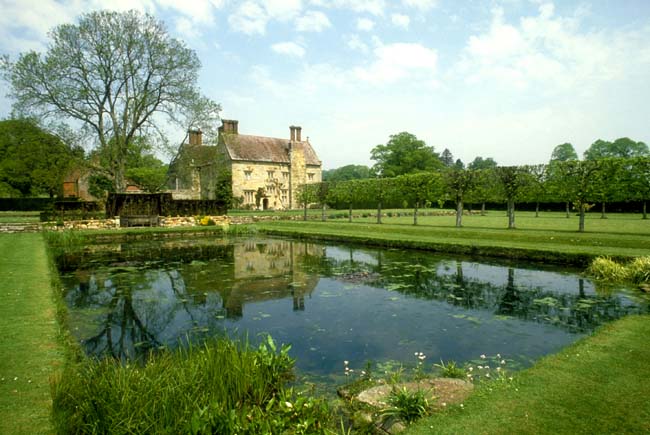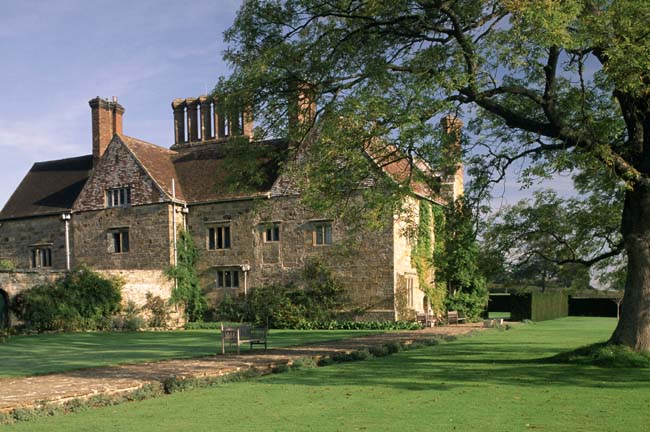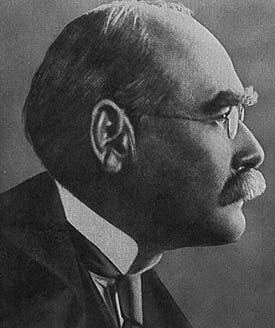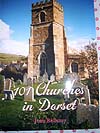Bateman's: Kipling's Sussex Jacobean Home
by Jean Bellamy
Years ago I had the privilege of being acquainted with a lady who
had been a governess to the children of Rudyard Kipling. Miss
Dorothy Ponton (or Dolly, as we knew her) subsequently became the
great man's private secretary, and at the time of her arrival at
'Bateman's', his famous Jacobean house near Burwash on the Sussex
Weald, he was 46 years of age. 'Short but well proportioned',
was how she described him, 'with a pronounced cleft in his chin,
his eye glowing through his spectacles beneath very dark bushy
eyebrows'. As well as teaching his daughter, Elsie, Miss Ponton
also coached his son, John, in Maths and English, her teaching
methods being quite unusual but very effective.

During her stay at 'Bateman's', Dorothy resided in Park Mill
Cottage, a converted hop-kiln separated from the garden proper by
a wooden gate. The cottage, which had a maid in attendance,
consisted of a small sitting room and kitchen with a bedroom
above, and was fronted by a well -- the sole source of water
supply. Sometimes the governess's duties took her abroad, as on
the occasion when she travelled to Switzerland where the family
were on holiday at Engleberg, so that John's coaching cold be
continued.
Sadly, and to his father's great grief, his son, who at 17 had
begged to be released from his studies to enter the army on the
outbreak of World War I, was killed at the Battle of Loos. He
was by then a 2nd Lieutenant in the newly-formed Second Battalion
Irish Guards, and his body was never recovered.
During the 1914-1918 war, Rudyard Kipling began to farm his own
land and bought some Guernsey cows. These successfully produced
Bateman's Baby, Bateman's Blizzard, Bateman's Bunting and
Bateman's Butterpat, amongst others. Some, to his great delight,
gained prizes at the Tunbridge Wells Cattle Show. In addition he
introduced a Sussex herd of red Shorthorns and two dray-horses,
the latter working on the farm to supplement the mechanical
appliances. There were piggeries too, which produced very
profitable litters, as well as a poultry farm and orchards
yielding good crops.
A new cottage behind Park Mill Cottage housed the gardener and
his wife who acted as dairymaid, and an elderly cowman occupied
Old Mill House. The latter, Sussex-bred and almost stone deaf
was nevertheless alert and always up betimes in the morning. His
speech was practically unintelligible to most folk, but the
reverse was also the case. After being given an order by Mrs.
Kipling which he appeared to have understood perfectly, two
minutes later he would tap on Miss Ponton's window and explain
apologetically, 'They do tawk so funny up theer. What do she
want?' Following which he would sidle up to her and place a very
large ear close to her mouth. When a calf was born he would
report the event with the words, 'Tell the master and the missus,
will'ee, she be a beauty!' -- regardless of the sex of the new
arrival.

In the summer of 1919, the Kipling's introduced a pedigree
bull, and as he appeared gentle enough, he was allowed to roam at
will in the pastures occupied by the Sussex herd. One morning
however, as the foreman's wife crossed the field to feed the
poultry, he tossed his head and followed her. Not liking his
demeanour, she promptly took to her heels and sought refuge in
one of the poultry-houses, much to the alarm of the inmates. The
playful beast then proceeded to trundle the poultry-house along
for some distance, his intermittent bellows in competition with
the shrieks of the foreman's wife and the cackling of the
terrified hens. Finally, angered by the noise, he charged in
real earnest, by which time the unaccustomed sight and sounds
having attracted the attention of some farm-labourers, he was
secured and condemned to solitary confinement.
At Harvest time, Bateman's Farm became a hive of industry, the
carting of the crops being performed by the dray-horses, Captain
and Blackbird. Captain had a sense of humour which sometimes led
him astray. One hot summer's day, Miss Ponton was returning to
her office when she came face to face with Captain trampling
around in the vegetable garden, his harness loose and jingling.
Before she could shut the gate, he pushed her aside with his nose
and plodded ponderously up the lane. A shout from one of the
farm-hands, from whom he had escaped during the dinner-hour,
reminded him of work so he jogged cheerfully on his way and tried
to dispose of his harness by rolling in a very muddy pond, much
to the alarm of the geese and ducks. Soon the enraged farm-hand
caught up with him, and at the crack of the whip, Captain stood
up. Finding that he was just out of reach of the lash, however,
and that his master had no intention of wetting his feet, he
remained standing in the cool water till working hours were
over.
 Rudyard Kipling evinced a talent for
writing from his school days, and by his second year had begun to
make up verse -- chiefly limericks on his school-teachers and
fellow pupils. His headmaster advised him to take up journalism
and so it was that in the autumn of 1891, Kipling set sail for
Bombay (where he had been born on 30th December 1865), and
visited Lahore. Restlessness gave him a desire to see more of
the world and he travelled extensively, storing in his memory
information about the places he visited and the customs and
characters, information which proved useful to him in his future
writings. He owed his unusual Christian name to the place where
his father, John Kipling, first met his mother, Alice MacDonald,
on the shore of Lake Rudyard in Staffordshire. Rudyard Kipling evinced a talent for
writing from his school days, and by his second year had begun to
make up verse -- chiefly limericks on his school-teachers and
fellow pupils. His headmaster advised him to take up journalism
and so it was that in the autumn of 1891, Kipling set sail for
Bombay (where he had been born on 30th December 1865), and
visited Lahore. Restlessness gave him a desire to see more of
the world and he travelled extensively, storing in his memory
information about the places he visited and the customs and
characters, information which proved useful to him in his future
writings. He owed his unusual Christian name to the place where
his father, John Kipling, first met his mother, Alice MacDonald,
on the shore of Lake Rudyard in Staffordshire.
At the age of twenty-five, Kipling revealed himself as the future
Empire Poet, and was encouraged to continue his writing by Lord
Tennyson, the Poet-Laureate at that time. In 1907, he won the
Nobel prize for literature, and many of his writings were
amazingly prophetic, foretelling events long before they took
place. As he died three years before the outbreak of hostilities
in 1939, his verse on the subject of the Second World War is
quite remarkable.
The family had moved to 'Bateman's' from Rottingdean to escape
from the day-trippers who constantly peered through the windows
of their double-fronted Georgian rectory known as 'The Elms'. At
'Batemans', screened by a yew hedge from inquisitive eyes,
Kipling found privacy, and here he wrote 'If', 'Puck of Pook's
Hill' and 'The Glory of the Garden'.
'Bateman's' is now owned by the National Trust and is open to the
public (ground floor only). Kipling's rooms and study remain
just as they were during his lifetime, as do the gardens and
ground where may be seen the turbine he installed. One of the
oldest working water-driven turbines in the world., it stands
alongside the watermill grinding corn for flour. 'Batemans' may
be visited from April to the end of October.
More Information:
We regret that we no longer have the resources to maintain up-to-date links and/or hours and pricing details for the various sites and attractions listed on this website. For more information about the location(s) listed above, please use your favorite search engine or visit Wikipedia.
 |
Jean Bellamy has been writing since 1970, and is the author of over 300 published articles and short stories. She has written three children's novels (all with a "West Country flavour"). A resident of Dorset, she is the author of several local history books, including Treasures of Dorset, A Dorset Quiz Book, Second Dorset Quiz Book, Dorset Tea Trail, Dorset as she was spoke, Little Book of Dorset, 101 Churchces in Dorset, and Cornwall: A Look Back. Jean loves to explore and write on all things British.
|
Article © 2008 Jean Bellamy
(Originally published in Freelance Informer of Sutton, Surrey)
Bateman's photos courtesy of Britainonview.com; Kipling photo courtesy of Wikipedia.org
|
